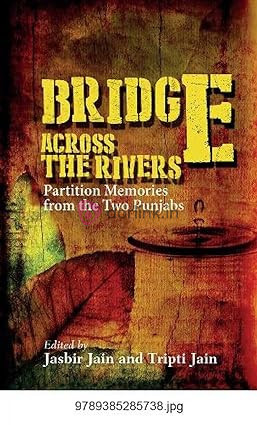Writer : No Name
Edited By : Tripti Jain & Jasbir Jain
Compiled By : NA
Translated By : NA
Publishers : Niyogi Books India
- Shipping Time : 10 Days
- Policy : Return/Cancellation?
You can return physically damaged products or wrong items delivered within 24 hours with photo/video proof.
Contact Customer Support for return initiation and receive return authorization via email. Securely package for return.
Refunds for eligible returns are processed within 7-10 business days via Bank Transfer.
Order cancellation allowed within 24 hours of placing it. Standard policy not applicable for undamaged/wrong product cases. Detailed info. - Genre : Literature>Memoire
- Publication Year : 2017
- ISBN No : 978-93-85285-73-8
- Binding : Card Board (Hard) with Gel Jacket
- Pages : 204
- Weight : 366 gms
- Height x Width x Depth : 8.5x5.5x0.5 Inch
If so, it will be notified
About the Book
Beyond Borders: Echoes of Partition and the Resilience of the Human Spirit
"Borders may divide lands, but they cannot erase memories, nor silence the whispers of a past that still seeks to be understood."
The history of Partition is neither singular nor static—it is a shifting, multifaceted narrative that changes depending on the perspective from which it is viewed. The past is never truly over; its shadows linger, shaping both collective and individual identities in profound ways.
This book delves into the emotional, political, and social impact of what is often called the third partition—the mass exodus and displacement that left a permanent scar on the subcontinent. In many ways, it rendered the individual invisible, transforming identity into a stereotype, leading to conventional patterns of behavior and a sense of forced conformity. The deep heartache of divided families and the frustration of lost dreams weighed heavily on the joy of newfound freedom.
Oral histories serve as a powerful counterpoint to the hegemony of written records. They delve into the psyche of individuals, exploring themes of morality, ethics, guilt, and regret—offering a deeply personal, humanized perspective of history. This collection goes beyond tales of violence and suffering, instead seeking to illuminate hope, harmony, resilience, and cultural unity in the aftermath of Partition.
Through these narratives, we witness a chronology of emotions—expectation, flight, loss, survival, and reflection. Gender, identity, and psychological trauma are examined in their rawest forms, yet beneath the sorrow lies an undeniable countercurrent of cultural oneness—a reminder that even in division, there remains an unbreakable thread of shared history and humanity.

